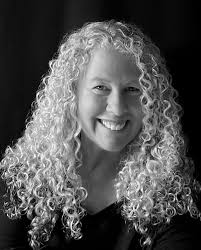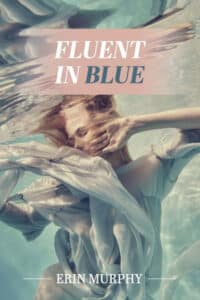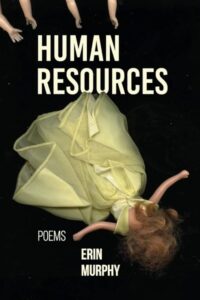
Erin Murphy continues her study of order, form, and classification
Poet Erin Murphy is credited with the creation of a new poetic form. It’s called the “demi-sonnet,” and it’s a seven-line form, half the length of a traditional sonnet. It also doesn’t rhyme (or doesn’t have to rhyme), and it leans in the direction of an aphorism. Murphy introduced the form in 2009, and her collection Word Problems: Demi-Sonnets was published in 2011.
I mention this because the idea of form, and related themes of order and classification, appear to have been a significant focus for Murphy’s poetry for a considerable period. Form helps establish order, as does classification. Murphy continues to explore these ideas and themes in her most recently published collections, Fluent in Blue: Poems (2024) and Human Resources (2025).

Erin Murphy
Fluent in Blue is comprised of 42 poems of varying lengths. Following an introductory poem entitled “The Internet of Things,” the collection opens with 22 relatively short stanzas about Interstate 95. It resembles a list poem, in that each stanza describes a specific event that happened to the poet along that corridor: being cited for reckless driving, a stop at a motel, a U-Haul breaking down, a job interview, a car stolen by joyriders, and a tanker truck catching fire, to mention only a few.
The highway becomes personal biography, creating a timeline of life events. (I understand this; my own biography could be written using Interstate 10, Interstate 55, and US Highway 67/167 as the organizational axes.) The poems of Fluent in Blue are not so much about order and form as they are about using the form of poetry to tell, and organize, one’s life history.
The poems seem familiar because they remind us of our own growing up and life experiences. She structures a three+-page poem entitled “When One Has Lived a Long Time in a Small Town” with zig-zagging stanzas, weaving back and forth like a river or stream, and you know the people Murphy writes about because they’re like the people you grew up with.
She uses poetry to imagine what she doesn’t know and the people she doesn’t meet. For a time, Murphy lived in London, and she considers the neighbor across the street, who may be doing exactly what she is.
London Neighbor

with a view of you at work in your twin
row house across the street. We’d tap
our keyboards for hours, then meet
eyes in the safe distance between.
Mid-afternoon, you shuffled to your
saffron kitchen for a cup of tea,
the window fogging with kettle steam.
At the corner market, you could have
been any other man picking up a loaf
of bread or can of beans. I kept you in
a frame: conscience, counterweight, dream.
Fluent in Blue has some of the aspects of her previous collections, but Murphy ranges beyond order and form. Those themes are there, but they’ve become more underlying ideas.
Her most recently published collection of 41 poems is Human Resources. I began reading with a somewhat hesitant eye; I have to wonder why anyone would give a poetry collection that title. (Lest you think I’m biased against the great HR profession, I can say that I did have several good friends who worked in it. Why they did will forever remain a mystery. I know, strong words from someone who worked in PR.)
In this collection, Murphy returns order and form to center stage, for if Human Resources is about anything, it’s about organizational order and form. She uses what sound like real HR statements to frame her poems about migrant labor, a work accident, a safety recall, a search for survivors after a hurricane with the notations sprayed on houses identifying whether bodies were found, what’s behind the surface shine of Chinese factories, Nazi use of slave labor, the use and abuse of mentally challenged men in a turkey plant, and other subjects.
Murphy uses the HR policy statements to chilling effect. In the section that beings with the HR policy on “Manager Responsibilities,” we find this poem:
The Swimmers and the CEOs

It’s surprisingly quiet, almost serene.
Victims seem to be climbing invisible
ladders. They can’t cry or scream.
So many swimmers, heads bobbing,
arms struggling to break the surface.
They can barely keep afloat.
Meanwhile, the dry folks on shore
glance up from shiny magazines.
Oh look, they say, They’re waving to us.
And so they smile and wave back
to the little people in the sea.
This is about order and classification, yes, but it is an oppressive order, one that treats humans like replaceable parts of machines.
Murphy received her B.A. degree in English from Washington College and her M.F.A. degree in English from the University of Massachusetts, Amherst, where she wrote her thesis under the direction of poet James Tate. She’s published or edited some 16 books, including poetry, non-fiction, and essays. She is a professor of English at Pennsylvania State University at Altoona, where she’s received several awards for teaching. Her poems have published in numerous literary magazines and journals and included in several anthologies. Her poetry has been recognized with several awards, and she’s been awarded four fellowships.
Her four most recent collections – Fields of Ache, Taxonomies, Fluent in Blue, and Human Resources – demonstrate a concern with form, organization, and classification. The surprise is how the individual poems, even with that focus, show awareness of the human condition, compassion, and care. Murphy masterfully uses form and order to bring us face to face with life.
Previously: Four Collections by Erin Murphy, Part 1
Photo by liz west, Creative Commons, via Flickr. Post by Glynn Young.
How to Read a Poem uses images like the mouse, the hive, the switch (from the Billy Collins poem)—to guide readers into new ways of understanding poems. Anthology included.
“I require all our incoming poetry students—in the MFA I direct—to buy and read this book.”
—Jeanetta Calhoun Mish
- Poet Sidney Lanier and the Lost Cause - October 2, 2025
- Poets and Poems: A.J. Thibault and “We Lack a Word” - September 30, 2025
- Poets and Poems: Catherine Strisik and “Goat, Goddess, Moon” - September 25, 2025


Leave a Reply